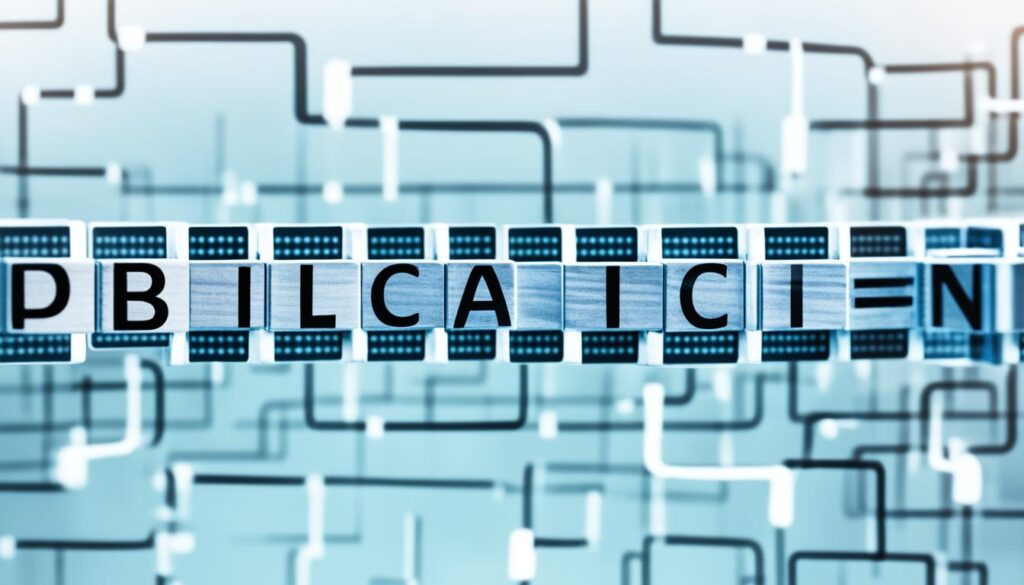
Welcome to an exciting era of digital agreements and transactions. In this article, I will delve into the world of blockchain smart contracts and how they are transforming the future of agreements. Blockchain smart contracts are revolutionizing traditional contract mechanisms by harnessing the power of blockchain technology.
So, what exactly are blockchain smart contracts? These are digital, self-executing agreements that are stored and executed on a blockchain. They eliminate the need for intermediaries and provide increased security, transparency, and efficiency in transactions. With blockchain smart contracts, the future of agreements is changing, paving the way for a more streamlined and reliable process.
Key Takeaways:
- Blockchain smart contracts revolutionize the way agreements are made and executed.
- They are digital, self-executing agreements that eliminate the need for intermediaries.
- Blockchain smart contracts ensure increased security, transparency, and efficiency in transactions.
- They are stored and executed on a blockchain, leveraging cryptographic technology.
- These contracts have the potential to transform industries by enabling secure and automated transactions.
How Blockchain Smart Contracts Work
Blockchain smart contracts harness the power of blockchain technology to create a transparent and secure system for executing agreements. At the heart of this innovation is the concept of a decentralized ledger, which serves as a tamper-proof record of all transactions.
Smart contracts are built using programming languages and are stored on the blockchain as code. Once deployed, these contracts become self-executing agreements that automatically execute when the predefined conditions are met. This eliminates the need for intermediaries, reduces the risk of fraud and error, and ensures that the agreed-upon terms are enforced.
The process of executing a blockchain smart contract involves several key steps:
- Creation: A smart contract is created using a programming language such as Solidity or Vyper. The contract’s terms and conditions are encoded into the contract’s code, specifying the actions to be taken when specific conditions are met.
- Deployment: Once created, the smart contract is deployed onto the blockchain, where it becomes an immutable part of the decentralized ledger. This ensures that the terms of the contract cannot be altered or tampered with.
- Execution: When the predefined conditions specified in the smart contract are met, the contract automatically executes itself. This self-executing nature eliminates the need for manual intervention or reliance on third parties.
- Verification: The execution of the smart contract is recorded in the blockchain’s decentralized ledger, providing a transparent and auditable record of the transaction. All participants in the network have access to this information, enhancing trust and transparency.
By leveraging blockchain technology and self-executing agreements, blockchain smart contracts offer numerous benefits. They streamline and automate the agreement process, reducing the time and effort required to execute transactions. Additionally, the decentralized nature of the ledger ensures greater security, as the data is stored across multiple nodes in the network, making it highly resistant to tampering or hacking.
Looking ahead, blockchain smart contracts have the potential to revolutionize various industries, including supply chain management, real estate, and finance. Their ability to automate complex processes, enhance transparency, and reduce costs makes them a promising technology for the future.
Benefits and Applications of Blockchain Smart Contracts
Blockchain smart contracts offer numerous benefits and have a wide range of applications across various industries. One of the key advantages is the significant increase in efficiency that smart contracts bring. By automating processes and eliminating manual tasks, smart contracts reduce the chances of human error and greatly speed up transaction times. This ensures that agreements are executed seamlessly, saving time and resources for businesses.
In addition to efficiency, blockchain smart contracts also provide enhanced transparency. With all parties involved having access to the same information stored on the blockchain, there is a higher level of trust and accountability. This eliminates the need for intermediaries and reduces the risk of disputes or fraud. The transparent nature of smart contracts also minimizes the need for audits, as all transaction details are securely recorded on the blockchain in a tamper-proof manner.
Furthermore, blockchain smart contracts are highly cost-effective. By removing the need for third-party intermediaries, such as lawyers or brokers, businesses can save on administrative and legal costs. These contracts streamline the agreement process, reducing the time and resources required for contract management. Industries like supply chain management and real estate can benefit immensely from the cost-effectiveness of smart contracts, as they involve multiple stakeholders and complex transactions.
FAQ
What are blockchain smart contracts?
Blockchain smart contracts are digital, self-executing agreements that are stored and executed on a blockchain. They use cryptographic technology to automatically enforce the terms of the agreement once the predefined conditions are met.
How do blockchain smart contracts work?
Blockchain smart contracts leverage blockchain technology to create a decentralized ledger that records and verifies transactions. These contracts are created using programming languages and are stored on the blockchain as code. Once deployed, they can be executed automatically without the need for intermediaries.
What are the benefits and applications of blockchain smart contracts?
Blockchain smart contracts offer benefits such as increased efficiency, enhanced transparency, and cost-effectiveness. They can be applied in various industries, including supply chain management and real estate, to automate processes, improve trust, and reduce administrative and legal costs.
How do blockchain smart contracts increase efficiency?
Blockchain smart contracts automate processes and eliminate manual tasks, reducing the chances of human error and speeding up transaction times.
What is the role of blockchain technology in smart contracts?
Blockchain technology provides a secure and transparent database that acts as a decentralized ledger for smart contracts. It ensures that all participants in the network have access to the same information and reduces the risk of fraud and error.
How do blockchain smart contracts enhance transparency?
Blockchain smart contracts provide transparency by storing all the information on the blockchain, which is accessible to all parties involved. This improves trust and reduces the need for audits and intermediaries.
Are blockchain smart contracts cost-effective?
Yes, blockchain smart contracts eliminate the need for third-party intermediaries, reducing administrative and legal costs and making transactions more cost-effective.
What industries can benefit from blockchain smart contracts?
Industries such as supply chain management and real estate can benefit from blockchain smart contracts by streamlining processes, increasing transparency, and reducing costs.
Can blockchain smart contracts be applied to supply chain management?
Yes, blockchain smart contracts can be applied to supply chain management to automate processes, increase transparency, and enhance the efficiency of transactions.
How can blockchain smart contracts improve trust in real estate transactions?
By using blockchain smart contracts in real estate transactions, all parties involved have access to the same information, reducing the need for trust in traditional contractual relationships and enhancing transparency and security.









